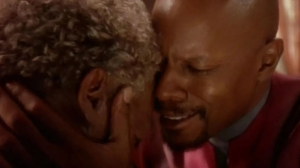With his new documentary Future Shock: The Story of 2000AD, filmmaker Paul Goodwin has taken on the challenging task of bringing the history of the beloved British comics magazine 2000AD to — at least potentially — a mainstream audience.
Videos by ComicBook.com

The film is described as “The story of how the multi-award winning comic came to be, how it has survived for 37 years, and how it continues to be an innovator and game-changer in both comics and the wider cultural world beyond. This feature documentary is a funny, moving and passionate chronicle of how a band of talented eccentrics came together to create something both visionary and extraordinary.”
Goodwin joined ComicBook.com to discuss the film, which is currently available on Blu-ray, DVD, and numerous video-on-demand services including iTunes, Vudu, and Amazon Prime.
Are there challenges to making a documentary about something that you’re obviously passionate about? It’s one thing to remain detached for an article or a short, but over the life of a feature it feels like that could be really challenging.
Yeah, for one thing it’s hard to cut bits off it! At one point we had a three hour, forty minute workprint! It was baggy, but had all the cool stuff from all the interviews we’d done so we spent the next few months hacking away at that to find the golden nuggets. Actually it’s great to be able to release some of this stuff on the Blu-ray because 2000AD has this fantastic array of crazy, provocative creators and fans that are such fun to listen to. As soon as the hardcore 2000AD fans saw the film they were onto us straight away saying “Yeah mate, good film but where’s all the rest of the stuff!!?” haha.
So, I wouldn’t describe it as ‘challenging’, because honestly when you work on a labour of love like this, you enjoy every damn minute – so to answer your question, no not really.
Imagery of Zenith was front-and-center in some of the promo material I saw at some point, and it made me wonder: Were there bits of 2000AD’s history that were harder to talk about than others?
Was Zenith hard to talk about? We spoke briefly about the rights dispute over Zenith with both Grant Morrison and Jason Kingsley, but it didn’t make it in. To be honest our lawyer advised against including specific legal issues like that in case someone came after my house!
But the Zenith dispute is basically the entire rights issue in a nutshell, historically 2000AD has sadly been part of that tragic ‘sign your rights away or you don’t get paid’ story that has blighted the history of the entire comics industry – and many other creative industries of course.
There were some issues between some of the Editors that we got stuck into in the film, personality clashes that are only to be expected when so much fiery creative talent is involved in one comic. So it wasn’t hard to talk about as such, but we wanted to make sure in the edit that everyone got a chance to argue their point, but be challenged fairly. Hopefully everyone is pals again these days, but at the end of the day I believe it was all simply down to everyone wanting the best for the comic.
What was the mission statement of the film going in? Was it just to tell the story? Did you want to change the dialogue about the magazine, particularly outside of the UK where it’s known more as a brand name than anything else?
Well I wanted to know the 2000AD story myself! So yeah that was part of it, but so, ok my period of hardcore buying and collecting 2000AD was like 84-92ish, which of course coincided with the ‘brain drain’ of British talent to DC and Marvel. I remember going to Calamity in Harrow after school and seeing Watchmen, Animal Man, Black Orchid, Hellblazer etc coming my out and just smashing the comic book industry to bits! We were so proud to follow the careers of our 2000AD favourites over to the mainstream US comics, the big boys right?
But it seemed weird that the breadcrumb trail never really led back and 2000AD itself never reaped the benefit of all the international attention being paid to their writers and artists, as you say it’s sort of known as a brand name in the US. So that’s a story I’ve wanted to tell my whole life, to hold up 2000AD and say “Hey look, all your favourite stuff started out here in this awesome comic, you should check it out!”.
Sean has called 2000AD ‘the Roger Corman studio of comics’, where so much top industry talent was nurtured, so hopefully the film now acknowledges that.
2000AD’s early appeal in the punk and anti-Thatcherism are covered pretty well here; is it kind of ironic, then, that the film comes out with the rise of Brexit and Trump, as antifascist protests are once again becoming more of a “thing” in popular culture?
Good question, yeah I guess so, it’s a real mess out there right now and there should always be a place where young people can be exposed to an alternative viewpoint from the mainstream. Today I see that on social media to a large extent – I’m always amazed by the amount of wild talent out there creating these instantaneous, hilarious satirical viral memes that hit the nail on the head.
2000AD did that through these fantastic adventure stories that were layered with acerbic satire and subversive humour and in its heyday they were mainstream and primarily aimed at 12 year old kids. I expect Pat Mills can’t write fast enough at the moment with so much fuel to burn! So yes, it’s important right now but I don’t think that need for satire ever goes away.
Most everyone you talk to in the documentary was reverential, but the magazine did have rifts with a number of creators over the years, largely about money. Were there any figures you wish you could have got to talk, who didn’t?
There were many, many people I would have loved to have spoken to but at the end of the day there’s only a set amount of time in a feature length doc. But you mean Alan Moore right? As I’m sure you’re aware he’s made it clear many times that, due again to rights disputes, he’s not keen to talk about this particular chapter of his career, which naturally I understand but at the same time it’s a shame that his voice is missing from this conversation.
Naturally the film discusses his contributions and the impact his work has had on pop culture at large, so while I would have loved to chat with him about his plans for Halo Jones, I respect his decision to decline an interview. But hey, during 40-odd interviews we were so lucky to speak to some of the biggest names in the comic’s history, as well as 2000AD fans who are now producing genre defining art themselves, so we couldn’t be more pleased.








